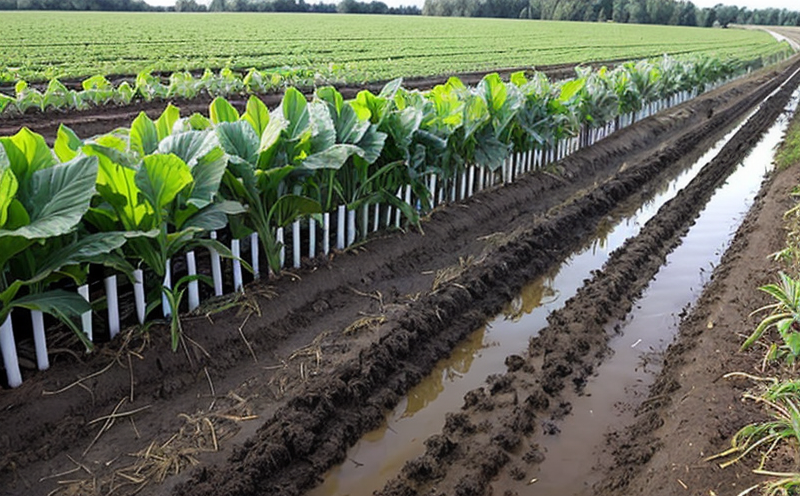APHA 2540D Total Suspended Solids Test in Agricultural Runoff Water
The APHA 2540D method is a widely recognized standard for determining the concentration of total suspended solids (TSS) in water samples, including agricultural runoff. This test measures particles that are retained on a filter and is crucial for assessing water quality and compliance with environmental regulations.
Total Suspended Solids (TSS) include all particulate matter suspended in water, which can significantly impact water clarity and the health of aquatic ecosystems. In agriculture, excessive TSS from runoff can lead to nutrient loading, reduced oxygen levels, and harm to fish and other aquatic organisms.
The APHA 2540D method is particularly important for monitoring runoff from farms and agricultural operations where fertilizers, pesticides, manure, and soil particles can wash into nearby water bodies. This test provides critical data that helps quality managers, compliance officers, R&D engineers, and procurement teams ensure they are meeting environmental standards.
Compliance with regulatory requirements such as the Clean Water Act (USA) or Agricultural Water Quality Regulation in California necessitates accurate TSS testing. The APHA 2540D method ensures that agricultural runoff does not exceed allowable limits set by environmental agencies.
The test involves filtering a known volume of water through a pre-weighed filter, drying the filter at a specified temperature, and then reweighing it to determine the mass of suspended solids. The difference between the post-test weight and the initial weight gives the TSS concentration in milligrams per liter (mg/L).
Accurate measurement of TSS is essential for effective water quality management. It helps in identifying sources of pollution, evaluating the effectiveness of treatment processes, and making informed decisions about agricultural practices to minimize environmental impact.
The APHA 2540D method is part of a suite of tests used by laboratories to assess the overall health of water bodies affected by agricultural runoff. By using this method, stakeholders can take proactive measures to reduce TSS levels, protect aquatic ecosystems, and comply with environmental regulations.
Scope and Methodology
| Key Components | Description |
|---|---|
| Sampling | Collect water samples from points of interest, ensuring proper preservation for analysis. |
| Filtration | Filter the sample through a pre-weighed filter using a vacuum filtration system. |
| Drying | Dry the filter at 103°C ±2°C until constant weight is achieved. |
| Weighing | Re-weight the filter to determine the mass of suspended solids. |
| Calculation | Determine TSS concentration by dividing the mass of suspended solids by the volume of water filtered. |
The APHA 2540D method is a standardized approach that ensures consistent and accurate results. This method aligns with international standards such as ISO, ASTM, EN, and IEC to provide reliable data for regulatory compliance.
Benefits
The implementation of the APHA 2540D Total Suspended Solids Test offers numerous benefits:
- Environmental Protection: Ensures that agricultural runoff does not exceed allowable limits, protecting aquatic ecosystems.
- Regulatory Compliance: Helps in meeting environmental regulations like the Clean Water Act and state-specific standards.
- Data Accuracy: Provides consistent and reliable data for monitoring water quality over time.
- Informed Decision-Making: Supports stakeholders in making evidence-based decisions regarding agricultural practices.
- Cost-Effective: Identifies sources of pollution early, reducing the need for costly remediation efforts.
- Public Trust: Builds confidence among communities and regulatory bodies by demonstrating a commitment to environmental stewardship.
The accuracy and reliability of TSS measurements are critical in preventing water pollution and ensuring sustainable agricultural practices. By integrating this method into their operations, organizations can contribute significantly to the preservation of natural resources.
Industry Applications
| Application | Description |
|---|---|
| Farm Management | Evaluating runoff from fields and determining the effectiveness of best management practices. |
| Agricultural Research | Investigating the impact of different fertilizers or soil types on water quality. |
| Environmental Monitoring | Tracking changes in TSS levels over time to assess environmental trends and impacts. |
| Regulatory Compliance | Ensuring that agricultural activities comply with local, national, or international environmental regulations. |
The APHA 2540D method is widely used in various sectors including agriculture, water management, and environmental science. Its versatility allows it to be applied across different regions and contexts, making it a valuable tool for stakeholders involved in agricultural runoff monitoring.
- Water Management: Monitoring TSS levels helps in managing water resources effectively by identifying sources of contamination early.
- Agricultural Research: Researchers use this method to study the effects of different farming practices on water quality.
The APHA 2540D Total Suspended Solids Test is an integral part of sustainable agriculture and environmental protection efforts. By leveraging this method, organizations can ensure that their operations are environmentally responsible and compliant with regulatory requirements.





